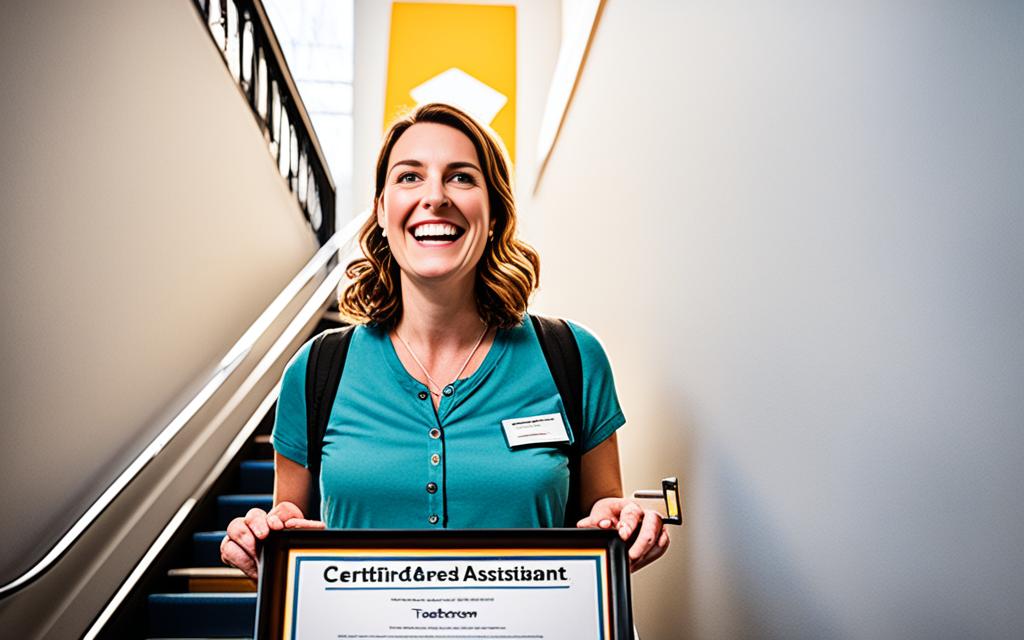Becoming a Teacher’s Assistant: Key Steps & Tips
Realizing you want a career as a teacher’s assistant can be a pivotal moment. It’s for those passionate about education and making a difference. This guide will show you the way, from understanding the role to personal development.
You’ll learn about the skills required, necessary education, and how to navigate the job market. It’s all about preparing for a rewarding educational support role. Let’s get you ready for this nurturing profession.
Key Takeaways
- Understand the multifaceted role of a teacher’s assistant.
- Identify the necessary educational requirements for success.
- Develop the essential interpersonal and professional skills required.
- Learn how to gain practical experience in the education field.
- Prepare for the certification and training needed for further advancement.
- Explore available job positions and learn effective application strategies.
Understanding the Role of a Teacher’s Assistant
The job of a teacher’s assistant is vital. They do more than help in the classroom. Their work includes teaching support and helping students grow.
Defining the Position: More Than Just a School Helper
Teacher’s assistants are key to a classroom’s flow. They aren’t just helpers. They prepare materials, manage group work, and meet students’ needs. This makes them important links between students and teachers.
The Impact of Support: Enhancing Classroom Learning
Teacher’s assistants make a real difference. They allow for small group work and more personal lessons. This approach is proven to boost student learning.
We should highly value a teacher’s assistant’s role. They handle both admin tasks and work directly with students. Recognizing their effort is crucial for education’s success.
Educational Requirements for a Teacher’s Aide
To become a teacher’s aide, you need certain educational qualifications and teacher’s aide training. This section talks about the important educational paths that can prepare you for this role.
First, decide if you’ll pursue an associate’s degree, a certification program, or meet local educational rules. These rules differ by district or state. It’s key to know these options to choose what fits your career goals and schedule best.
- Associate’s degrees in paraprofessional education, child development, or related fields are popular. They cover theory and hands-on aspects of being a teacher’s aide.
- Certification courses focus on skills like classroom management and support for students with special needs.
- In some places, only a high school diploma and some training on the job are needed. But, having more certification can boost your job chances.
When picking your teacher’s aide training, consider the rules of the state or district you want to work in. These requirements can be simple or very detailed. They could include credits in areas like special education or bilingual teaching.
| Education Level | Duration | Focus Areas |
|---|---|---|
| Associate’s Degree | 2 years | Fundamental teaching skills, child psychology |
| Teacher’s Certification | 6 months to 1 year | Classroom management, special education basics |
| High School Diploma | N/A | Varies widely; often supplemented by on-the-job training |
Knowing these educational qualifications helps you plan your path to being a successful teacher’s aide. It ensures you meet the criteria to effectively help in schools.
Essential Skills for a Successful Teaching Assistant
Starting a career as a teaching assistant means you need special skills. These skills make learning better and help students a lot. Let’s look at how certain abilities are key for doing well in this job.
Communication: Bridging the Gap Between Students and Teachers
Being good at communication is very important. It’s not just about talking. It’s about listening, understanding different needs, and making sure there is good conversation between students and teachers. This makes sure all students feel important and part of their learning journey.
Adaptability: Thriving in a Dynamic Classroom Environment
Change is always happening in classrooms. This means teaching assistants need to be very adaptable. You might need to change how you do things or help students in different ways. Being flexible helps you deal with surprises without stopping the learning.
Patience and Empathy: Cultivating a Supportive Learning Space
Patience and empathy are core to being a good teaching assistant. Creating a place where learning is supported means understanding how each student learns. It also means recognizing their feelings and educational needs. These qualities help students feel safe to grow and learn.
This is a quick look at how some skills impact the classroom:
| Skill | Impact on Learning Environment | Examples of Application |
|---|---|---|
| Effective Communication | Improves clarity and understanding, builds trust. | Translating teacher’s instructions into more accessible language for students. |
| Adaptability | Keeps the classroom environment fluid and responsive to student needs. | Modifying lesson plans on-the-fly to suit the class’s mood or energy levels. |
| Patience and Empathy | Supports emotional well-being, encourages student participation. | Spending extra time with students who struggle with certain concepts. |
Acquiring Relevant Experience in Education
For those entering education, hands-on experience is key. Engaging in internships and volunteering in schools offers crucial classroom experience. This is essential for success as a teaching assistant.
Volunteering: Gaining Insight and Practical Knowledge
Volunteering in schools is a deep dive into the educational world. You get a real look at the everyday duties of teachers. It also has a big impact on students’ learning. This experience makes you better at teaching and handling different types of students.
Internships: Hands-On Experience in an Educational Setting
Internships in education put your learning into action. They come with duties that get you ready for leading a classroom, making lesson plans, and grading students. This boosts your growth in the education field.
| Experience Type | Skills Gained | Impact on Career |
|---|---|---|
| Volunteering in Schools | Classroom management, student engagement | Enhanced understanding of educational environments |
| Educational Internships | Lesson planning, educational assessments | Direct application of educational theory in practice |
Certification and Training for Instructional Assistants
If you’re looking to grow in the education field, getting a teacher’s assistant certification is key. It opens up many doors, whether you’re new to the area or want to boost your qualifications. A range of instructional assistant training programs are out there. They meet different educational needs.
Certification programs prepare you to support both teachers and students well. We’ll look at some main training programs and certifications. They can make you a proper instructional assistant.
- National Certifications: These are valid across various states, boosting your appeal to many schools.
- State-Specific Certifications: Some states have unique rules based on their educational policies or needs.
- Online Training Programs: They offer flexibility, letting you learn at your pace while juggling life’s demands.
First off, find out what your state or local area requires. Community colleges and vocational schools often have what you need. Plus, many institutions now offer online courses. This is great for those with tight schedules.
| Program Type | Duration | Key Focus Area |
|---|---|---|
| Full Certification | 6-12 months | Comprehensive instructional techniques |
| Short Course | 3-6 months | Specific educational support skills |
| Workshop | 1-3 months | Intensive, hands-on training |
Ending off, earning a teacher’s assistant certification truly matters. It’s about growing professionally and giving more in education. Joining instructional assistant training not only boosts your career chances. It lets you make a real impact in the classroom.
Exploring Job Opportunities for Teacher’s Assistants
Starting a career as a teacher’s assistant brings many chances in education. It’s key to know where to look for jobs and the value of growing professionally. This can make your career path much better.
Where to Find Teacher’s Assistant Positions
Jobs for teacher’s assistants are mainly in schools, both public and private. They’re also in special education, daycare centers, and after-school programs. Looking for jobs on websites focused on educational roles can make it easier to find good positions.

| Job Platform | Type of Institution | Location Flexibility |
|---|---|---|
| EdJobsNation | Public/Private Schools | Nationwide |
| TeachEarly | Daycare Centers | Urban Areas |
| SpecialEdCareers | Special Education Institutions | Limited Locations |
Networking and Professional Development
Networking and improving your skills are key for teacher’s assistants. Doing things like going to workshops, joining groups, and being part of local education events are important.
Teacher’s assistants gain a lot from ongoing learning and development. These efforts improve their skills and help them stand out in the job market. Connecting with others in the field can open up new chances and insights.
Looking for both standard and new ways to grow and find jobs is smart. It helps teacher’s assistants find great jobs in education.
Preparing Your Application: Resumes and Cover Letters
Starting your journey to become a teacher’s aide involves a great application. It needs to catch the attention of hiring managers. This guide will show you how to make standout documents.
Begin with your teacher’s aide application by creating a professional resume. Your resume should share your education and experience that fits a teacher’s assistant role.
- Personal Information: Full name, professional title, and contact info at the top.
- Professional Summary: A brief, impactful statement summarizing your skills and motivations.
- Education: Degrees and certifications that validate your educational background.
- Relevant Experience: Previous roles or volunteer work that demonstrate your abilities in educational settings.
- Skills Section: Specific teacher’s assistant skills such as communication, classroom management, and adaptability.
Your instructional assistant resume lays the foundation. Your cover letter allows you to connect more personally. It should express your passion for helping students and your alignment with the school’s mission.
“A well-crafted cover letter and resume set the stage for your potential to influence young minds in the classroom.”
| Component | Importance | Tips |
|---|---|---|
| Resume Layout | Crucial | Keep it organized and easy to read; use bullet points and clear headings. |
| Cover Letter Personalization | High | Address the hiring manager by name, and tailor the content to the specific school and job opening. |
| Details and Achievements | Essential | Include quantifiable achievements and relevant details that capture your contributions. |
| Proofreading | Indispensable | Meticulously check for typos and grammatical errors to present a professional document. |
Your teacher’s aide application introduces you. With a strong instructional assistant resume and a meaningful cover letter, you show you’re a perfect candidate. With these, you can take big steps toward your education career.
Effective Strategies for Teacher’s Assistant Interviews
Getting ready for your teaching assistant interview is key. You need to show not just what you know but also how much you care about education. In this part, we’ll look at how to share your ideas about teaching. And how to show you’re great at working with others in schools. These are important things that schools look for.
Presenting Your Educational Philosophy
Your educational philosophy is like a window into your teaching soul. It shares what you believe about teaching. Make sure to talk about it clearly in your interview. Mention how you keep students involved, how you keep learning, and how you deal with classroom issues. Showing your teaching values can really help them see if you’re right for their school.
Highlighting Teamwork and Collaboration Skills
Being able to work well with others in school is super important. Tell them about times you worked with teachers and staff to help students learn better. Point out how good you are at talking to others, changing plans when needed, and solving problems when working in a team. This can really show them you’d be a great addition.
| Key Aspect | Approach | Impact in Team Settings |
|---|---|---|
| Communication | Open, consistent, and adapted to audience needs | Ensures smooth workflow and understanding across team members |
| Adaptability | Flexible approach, ready to handle unexpected changes | Keeps team efforts aligned with educational goals despite challenges |
| Problem-solving | Creative and analytical methods to address issues | Reduces disruptions in learning, enhancing educational continuity |
Navigating State Regulations and School Policies
Understanding state education regulations and mastering school policy comprehension are crucial as a future teacher’s assistant. These rules define how the school runs and your role in it. They impact how you work each day.
Navigating these rules might seem tough at first. Yet, it’s more about understanding their effect on your job than knowing every detail. From safety rules, privacy of student info, to how you help in class, each policy shapes your work and success.
- Review the latest updates on state education regulations annually.
- Attend workshops and training sessions focusing on school policy comprehension.
- Consult with more experienced staff or your supervisor if you are unsure about specific policy implications.
Following these steps boosts your performance and keeps you on the right track. It helps you meet all legal and school rules.
| Aspect | Description | Impact on Role |
|---|---|---|
| State Regulations | Legal requirements all schools must follow | Defines permissible actions within the classroom and school premises |
| School Policies | Institution-specific rules and procedures | Influences day-to-day tasks and responsibilities of staff |
Knowing state education regulations and school policy comprehension well makes you confident in your position. It leads to your success and the safety of the students you help.
Specialization in Teacher’s Assistant Roles
When you become a teacher’s assistant, you can pick a path that matches your interests. You might work with students who need extra help. Or, you could focus on a subject you’re really good at. This choice can really make your job more exciting and fulfilling.
Focusing on Areas of Interest or Expertise
If you specialize, you become an expert in areas like reading, math, or how to manage a classroom. Being so skilled means you’re really valuable to schools. Plus, it’s rewarding to see the difference you make.
Understanding Special Education Aides and Inclusive Education Support
Special education assistants play a key role in making sure all kids can learn together, no matter their challenges. This job is about creating lessons that fit every student. It’s about making sure everyone has the chance to do well.
Choosing to focus on special education means always learning new ways to teach and help. It’s about being ready to change and grow. Helping students to tackle obstacles and see their own success is incredibly rewarding.
If you’re thinking about special education, remember the big difference you could make. Specializing connects you deeply with your work and leads to a career that truly matters to you and helps others.
Continuing Education for Teaching Assistants
In the ever-changing world of education, it’s vital for teaching assistants to keep learning. This helps you grow professionally and stay up-to-date. You’ll remain effective in the shifting landscape of education.
Learning Opportunities for Career Advancement
Moving forward in your career means diving into educational programs. These programs expand what you know and can do. It’s key to getting better and being more helpful in class.
Workshops, Certifications, and Online Courses
Getting involved in workshops, earning more certifications, and taking online courses are great ways to grow. These options boost your learning and can change how you teach and manage your class. Consider these choices:
- Workshops: They offer hands-on learning in new teaching methods or tech.
- Certifications: You can get trained in special areas like special education or classroom management.
- Online Courses: These let you learn at your pace and focus on what interests you in teaching.
Choosing to continue your education in teaching helps you develop professionally. It makes your career richer and helps your students learn better.
Challenges and Rewards of Being a Teacher’s Assistant
Starting a job as a teacher’s assistant has its ups and downs. You’ll face teacher assistant challenges and find rewards in educational support. It requires you to be adaptable and resilient. Yet, it lets you make a big impact on students’ growth and their learning settings. Let’s look at what makes this role both challenging and rewarding.
Challenges
- Handling diverse learning needs without much training can be tough.
- Keeping the class in order while teaching tests your multitasking skills.
- The job’s emotional and physical demands may lead to burnout if unchecked.
Rewards
- It’s rewarding to see students improve because of your help.
- You’ll form meaningful bonds with students, improving the learning environment.
- This job gives you great experience for more education roles in the future.
Balancing the teacher assistant challenges with the rewards in educational support makes for a fulfilling career. Below, we compare some key challenges and benefits to give you a clearer understanding.
| Challenges | Rewards |
|---|---|
| Limited authority in student discipline | Developing leadership skills through hands-on experience |
| Often temporary or part-time positions | Potential for career advancement in education |
| Adapting to different teaching styles | Flexibility and varied educational exposure |
Every challenge faced as a teacher’s assistant teaches you valuable skills and insights. These are essential for a career in education. By tackling the difficulties and enjoying the successes, you’re not just helping yourself. You’re also aiding in the academic growth of the students you support.
Conclusion
Starting a career as a teacher’s assistant takes a good understanding of the job and a strong commitment to help in education. This article has shown the important steps needed to thrive in this role in schools. We have explained the education needed, skills, and experiences that help make a big difference in the classroom.
Being successful as a teaching assistant means having solid academic preparation, gaining relevant experience, and developing strong interpersonal skills for a diverse learning setting. It’s crucial to keep learning and growing professionally. This makes you a key player in your education team. The job of a teacher’s assistant goes beyond regular tasks. It’s about helping students grow, making education accessible to all, and supporting main teachers.
If you love creating a positive learning environment and want to help students succeed, being a teacher’s assistant is a great choice. With the advice given, you’re more prepared to face the challenges and enjoy the rewards this career brings. Your work in education is very important for the young minds of tomorrow. With the right preparation and dedication, you’ll do great as an education professional.
FAQ
What are the first steps to pursuing a career as a teacher’s assistant?
First, learn about what a teacher’s assistant does and what skills you need. Then, get the right education, like an associate’s degree or special training. It’s also important to get hands-on experience by volunteering or interning in schools.
What responsibilities does a teacher’s assistant typically handle?
Teacher’s assistants do more than just help out in the classroom. They support teaching, improve the learning space, and help students directly. They also assist teachers with organizing materials, managing the classroom, and sometimes even grading.
This all helps make education better for students.
Are there specific educational requirements to become a teacher’s aide?
Yes, becoming a teacher’s aide requires certain educational achievements. This varies by location but usually involves some college courses or an associate’s degree. Some jobs also ask for a specific certification in teaching assistance.
What skills are essential for a successful teaching assistant?
Key skills include good communication, being adaptable, and having patience and empathy. Being organized, able to work well with others, and solving problems are also important. These help in creating a positive learning environment.
How can I gain relevant experience to prepare for a teaching assistant role?
Get experience by volunteering in schools or through internships. These chances let you see what the job is like. They also give you practical skills that will help you do well as a teacher’s assistant.
What type of certification and training might I need as an instructional assistant?
Depending on where you are, you might need to get certified. Training often covers child development and teaching methods. Sometimes, you’ll learn about special education too. You can find these programs at various institutions or online.
Where should I look for job opportunities as a teacher’s assistant?
Look for jobs on school district websites, at education job fairs, and on online job sites. Educational staffing agencies can help too. Networking and professional development are also great ways to find opportunities.
How should I prepare my application for a teacher’s aide position?
Your resume should outline your relevant experience and any special qualifications. In your cover letter, share your love for teaching. Explain how your skills make you a great fit for the role.
What strategies can help me succeed in a teaching assistant interview?
Talk about your beliefs on education and teaching effectively. Share your teamwork experiences. Be ready to discuss how you solve problems and adapt in teaching settings.
Why is it important to understand state regulations and school policies as a teaching assistant?
Knowing these rules makes sure you follow the law and education standards. It helps you support teaching and learning the right way. This is key to being effective in your role.
Can I specialize as a teacher’s assistant, and if so, in what areas?
Yes, you can choose to specialize in areas like literacy or special education. This lets you focus on what interests you most. Special education assistants, for example, help students with different needs.
What continuing education options are available for teacher’s assistants who want to advance their careers?
There are workshops, more certifications, and online classes for teacher’s assistants. These help you keep up with new teaching methods. They also allow you to improve your skills and move forward in your career.
What are some challenges and rewards of being a teacher’s assistant?
Working as a teacher’s assistant can be tough. Challenges include handling different student needs, managing behaviors, and staying energetic. But, it’s rewarding. You get to help students learn and grow. Plus, you’re part of a team making a difference in education.







